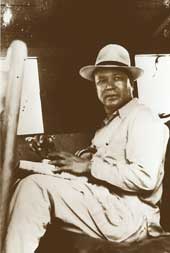Jaipal Singh
| Jaipal Singh | |
|---|---|
| Born |
3 January 1903 |
| Died |
20 March 1970 Delhi, India |
| Occupation | Hockey player |
| Olympic medal record | ||
|---|---|---|
| Men's field hockey | ||
| | 1928 Amsterdam | Team competition |
Jaipal Singh Munda (3 January 1903 – 20 March 1970) was a Munda tribal man, who captained the Indian field hockey team to clinch gold in the 1928 Summer Olympics in Amsterdam. He is well known for his sportsmanship and political skills.
Later he emerged as a sole leader of Adivasi cause and creation of a separate home land for adivasis of central India. As a member of the Constituent Assembly of India he actively campaigned for the rights of the scheduled tribes.
He is popularly known as "Marang Gomke" which means the Great Leader. This name was given to him by the tribal people of Chota nagpur region.
The Adivasi Mahasabha

He formed Adivasi Mahasabha in 1938, himself as its president. After independence the name of the party was changed to Jharkhand Party to accommodate non-tribal people to achieve long-term goals. He is popularly known as "Marang Gomke" (meaning Great Leader) by the tribals of Chhotanagpur. He was a gifted speaker and represented all the tribals of India at the Constituent Assembly of India (which was responsible for drafting the constitution of Independent India). The following is an excerpt from a famous speech made by him, where, while welcoming the Objectives Resolution, he highlighted the issues facing the Indian tribals.
- “As a jungli, as an Adibasi, I am not expected to understand the legal intricacies of the Resolution. But my common sense tells me that every one of us should march in that road to freedom and fight together. Sir, if there is any group of Indian people that has been shabbily treated it is my people. They have been disgracefully treated, neglected for the last 6,000 years. The history of the Indus Valley civilization, a child of which I am, shows quite clearly that it is the new comers — most of you here are intruders as far as I am concerned — it is the new comers who have driven away my people from the Indus Valley to the jungle fastness ... The whole history of my people is one of continuous exploitation and dispossession by the non-aboriginals of India punctuated by rebellions and disorder, and yet I take Pandit Jawahar Lal Nehru at his word. I take you all at your word that now we are going to start a new chapter, a new chapter of independent India where there is equality of opportunity, where no one would be neglected."[2][3]
Hockey player
Today, "Marang Gomke" Jaipal Singh Munda is remembered primarily for his able stewardship of 'Adivasi Mahasabha' and then of 'Jharkhand Party' which spearheaded the movement for a separate tribal majority state of Jharkhand and for his active contribution to the cause of tribes of India as a member of the Constituent Assembly of India. Very few, however, know that Jaipal Singh was one of the world's finest field hockey player of the period.
Jaipal Singh Munda was born on 3 January 1903 in remote Tapkara village of what was then Khunti Sub-division of the then District of Ranchi in the state of Jharkhand India. Majority of the inhabitants of Tapkara village are from 'Munda' tribe. Jaipal Singh too was from a Munda family that had embraced Christianity. After initial schooling at the village church school, Jaipal Singh shifted to St. Paul's School, Ranchi run by the Christian Missionaries of the SPG Mission of the Church of England. A keen and gifted field hockey player, Jaipal Singh was a brilliant student and exhibited exceptional leadership qualities from a very young age, which was noticed by the missionaries, who took him to England for higher studies at the University of Oxford. Jaipal Singh was a member of the Oxford University Hockey Team. The hallmark of his game as a deep defender were his clean tackling, sensible gameplay and well directed hard hits. He was the most versatile player in the Oxford University Hockey Team. His contribution to the University Hockey Team was recognised and he became the first Indian student to be conferred "Oxford Blue" in Hockey.
In 1928, while he was in England, Jaipal Singh was asked to captain the Indian Hockey Team for the Amsterdam Olympics, 1928. Under Jaipal Singh's captaincy the Indian team played 17 matches in the League Stage of which 16 were won and one drawn. Due, however, to an unfortunate incident of tiff with the English Team Manager A.B. Rossier, Jaipal Singh left the Team after League phase and therefore could not play in the games in the knockout stage. In the final, the Indian Team defeated Holland by 3-0.
On returning to India, Jaipal Singh was associated with Mohan Bagan Club of Calcutta, where he started the Hockey Team of the Club in 1929. He led its hockey team in various tournaments. After retirement from active hockey, Jaipal Singh served as Secretary of Bengal Hockey Association and as a member of Indian Sports Council.
Death
Jaipal Singh died on 20 March 1970 in Delhi. At that time, foundation of a sports stadium was being laid in Ranchi City by the District Administration of Ranchi. Birsa Seva Dal submitted a proposal to the District Administration to honour Late Jaipal Singh by naming the new upcoming stadium as 'Jaipal Singh Stadium'. This was accepted and the Stadium was named 'Jaipal Singh Stadium'. Recently, the State Government of Jharkhand has named the grand games complex and games village built at Ranchi for the next National Games as 'Jaipal Singh Munda Games Complex'.
See also
External links
References
- ↑
- ↑ "Tribal Zone".
- ↑ Ramachandra Guha (2008). India After Gandhi: The History of the World's Largest Democracy. ISBN 978-006095858-9.